Experimental research on 13,000 American finds that climate change persuasive messaging can have a significant pro-climate influence on beliefs but that influence does not extend to pro-environment donations. Most successful messaging emphasised the scientific consensus of human-caused climate change while inoculating readers against the fake debates that undermine this consensus. Messaging highlighting the need to protect the purity of American land also had a large positive effect.
Category: Misinformation 101
-
No, your snow is not made of plastic
You might have seen videos of people attempting to melt snow from their backyard with a lighter, only to find that the snow doesn’t appear to be melting, but instead looks like it’s burning, turning black and giving off a weird plastic smell. Some even say the snow “looks” unnatural.
We would like to reassure you. Your snow (and theirs) is not fake and is not made of plastics. That doesn’t mean what these people have experienced isn’t true. But, there is a scientific explanation for it (1,2).
The reason people are not seeing the snow dripping away as the flame melts is because the small amount that does melt is immediately sponged up by the remaining snow – essentially, the snowballs are refreezing more densely and shrinking. Instead of melting, the snow could also be undergoing a process called sublimation, where a substance goes directly from solid to gas without ever becoming liquid (1,2,3).
As for the burnt mark on the snow and the bad smell, these come from the combustion of butane from the lighter. As it burns, butane gives off a petroleum-like odor and creates soot, which sticks to the cold snow. The same thing would happen if you put a lighter to a cold glass (1,2,4,5,6).
Now, some videos claim the snow looks unnatural. But in reality, not all snowflakes look like the perfect six-armed shapes we often picture. Snowflakes form around tiny dust or pollen particles, and their final shape depends on temperature and humidity as they fall through the clouds. Warmer temperatures with high humidity produce needle-like crystals, while colder and drier air produces simple hexagonal plates. The classic six-armed snowflakes usually form around −15 to −20 °C with medium to high humidity (7,8).
It’s ok to be surprised when something doesn’t behave the way we expect. That doesn’t mean it’s fake. Questioning our assumptions can push us to look deeper.
Sources- Debunking viral “burning snow” videos. Here’s what really happens | CBC News | January 2026
- Fact Check: Explaining ‘fake Texas snow’ posts and ‘scorched snow’ videos | Reuters | March 2021
- Sublimation | Definition, Examples, & Facts | Britannica
- Effects of oxygen on soot formation in methane, propane, and n-Butane diffusion flames | Combustion and Flame | May 1995
- It’s not fake — snow that doesn’t melt when burned has scientific explanation | Saskatoon StarPhoenix | December 2025
- Butane | C4H10 | CID 7843 | PubChem
- How do snowflakes form? Get the science behind snow | National Oceanic and Atmospheric Administration | December 2022
- Snowflake Science | Ontario Science Centre
Share our original Bluesky Post!
View our original Instagram Post!
-
Screen Use and Child and Adolescent Health in Canada: Triangulation of Evidence Assessing the State of the Effort
Canadian parents and School Boards across Canada are increasingly worried about the impact of screen use on child development; the issue is receiving increased attention in research and policy contexts as well as from media outlets.
-
Effectiveness of Leveraging Social Media Influencers to Address HPV Vaccine Hesitancy: Insights from a Quasi-experimental Study in Nigeria
Social media influencers in Nigeria were successfully leveraged to address HPV vaccine hesitancy by sharing public health messaging with audiences.
-
Correlation does not equal causation
Correlation does NOT equal causation. Just because two lines move together on a graph does not mean that one causes the other. More on this in today’s video.
Share our original Bluesky Post!
Correlation does NOT equal causation. Just because two lines move together on a graph does not mean that one causes the other. More on this in today’s video. For more critical thinking resources: tinyurl.com/SUFCriticalThinking #ScienceUpFirst #LaSciencedAbord #TogetherAgainstMisinformation
— ScienceUpFirst (@scienceupfirst.bsky.social) February 5, 2026 at 12:12 PM
[image or embed]View our original Instagram Post!
-
Misinformer Tactics: Catherine O’Hara edition
Last week, Canada lost a national treasure and we wanted to do a tribute in the way we know best.
Please enjoy a few of our favourite Catherine O’Hara moments as misinformer tactics.
Sending love to all those who are feeling this loss 💔
View our original Instagram Post!
-
Interventions to reduce vaccine hesitancy among adolescents: a cluster-randomized trial
A cluster-randomized trial with nearly 9,000 high school students from 399 different schools in France found that providing general vaccination knowledge, either through pedagogical activities or chatbot engagement, significantly improved vaccination attitudes. This finding suggest, contrary to other evidence, that addressing the knowledge deficit can positively influence personal perspectives.
-
Dialogues with large language models reduce conspiracy beliefs even when the AI is perceived as human
An experiment with nearly 1,000 participants finds that conversations with artificial intelligence large language models (LLMs) can reduce participants’ confidence in conspiracies and other inaccurate beliefs. Because the finding holds whether the participant knows the message is being by delivered by a human or an LLM, this indicates that what is most important in persuasive discourse is compelling messages.
-
KFF Health Information and Trust Tracking Poll: Health Information and Advice on Social Media
Survey research on American public finds that over half of American adults, including higher numbers of young adults, and Black and Hispanic adults report occasionally using social media for health information and advice. Health information – notably on the topics of weight loss, nutrition, and diet – also reaches audiences who report never using social media for health information. Approximately 15% (or 1 in 6) report social media influencers are a regular source for health information and advice. People who reported regularly using social media for health information and advice, approximately one third rely on the health content from a particular influencer.
-
Big Pharma is not hiding a secret cancer cure
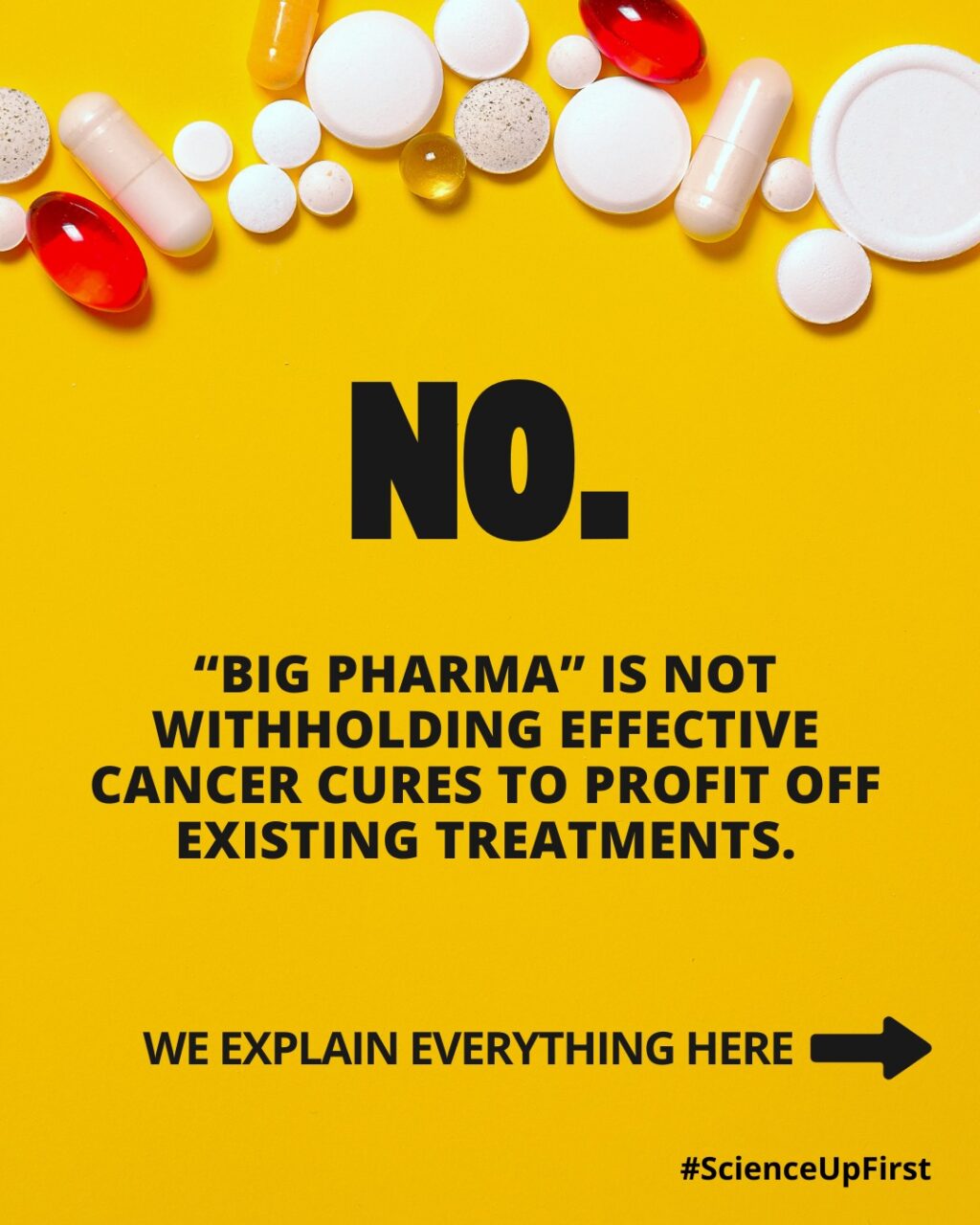
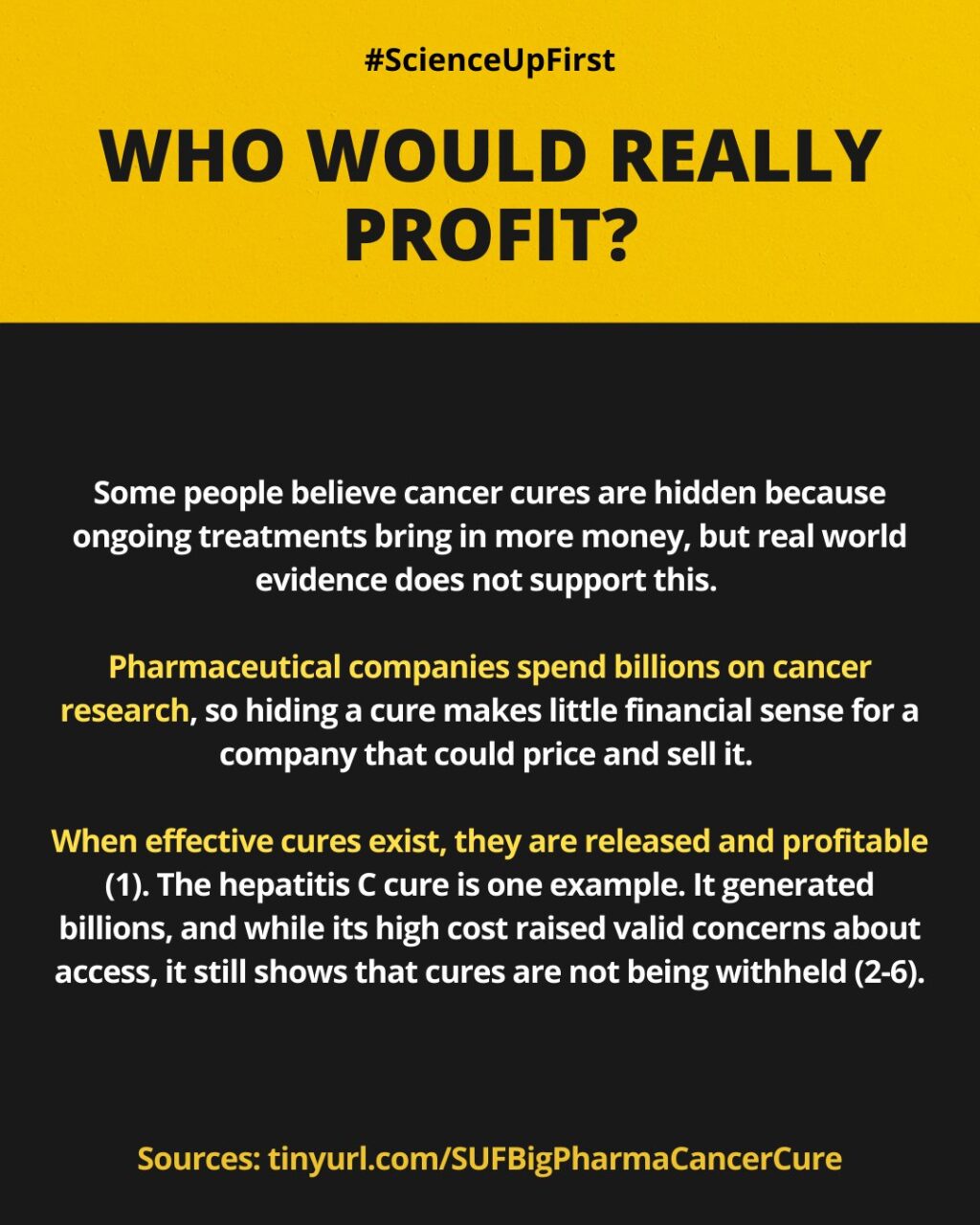
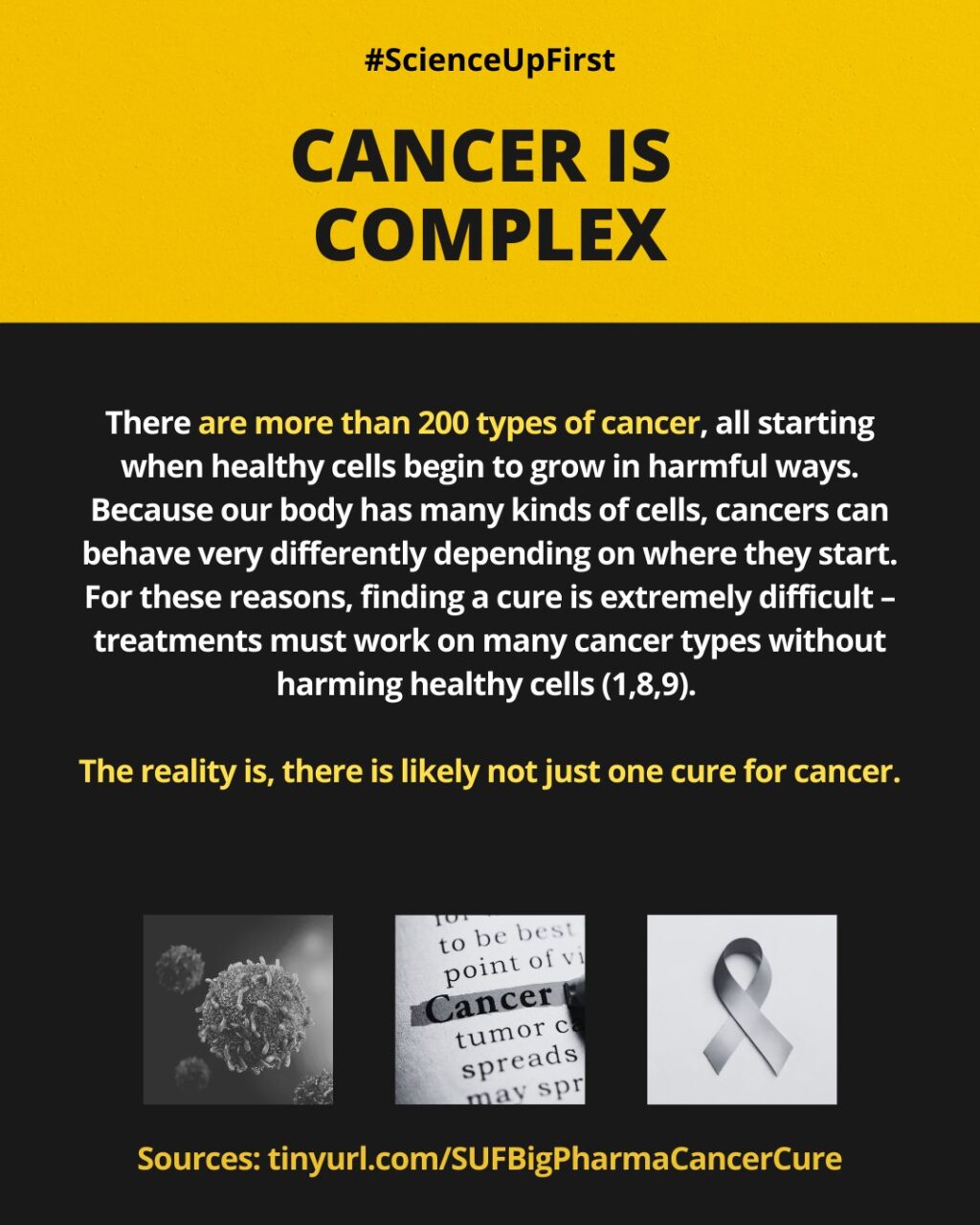
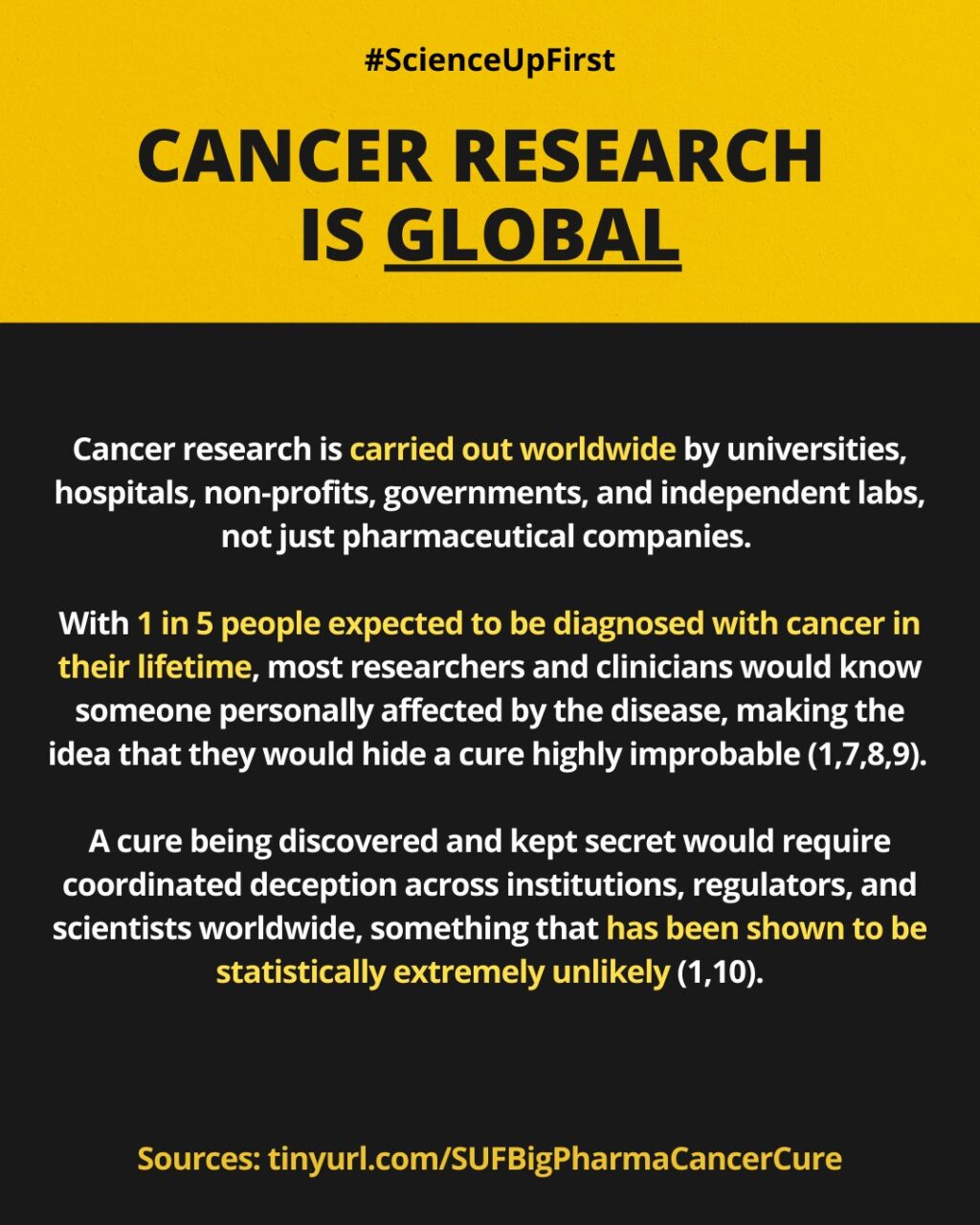

There’s no secret cancer cure being hidden by “Big Pharma.”
Cancer research is global, complex, and driven by people who dedicate their lives to helping patients.
Sources- Busting the conspiracy – is there a hidden cure for cancer? | The Children & Young People’s Cancer Association | November 2023
- Hepatitis C: The Evolution of Treatments | Healthline | April 2019
- Hepatitis C Cure, Sofosbuvir, Turns 5 Years Old: The Vast Majority of People Still Nave Not Been Treated | Hep Coalition | December 2018.
- Maker of $1,000 hepatitis C pill was focused on profits, not patients, report finds | PBS News | December 2015
- A guide to the economics of HCV cure in 2017 | Infectious Disease Clinics of North America on PubMed Central | June 2019
- Non-profit’s $300 hepatitis C cure as effective as $84,000 alternative | The Guardian | April 2018
- Global cancer burden growing, amidst mounting need for services | World Health Organization | February 2024
- Cancer treatment myths: Any truth to these common beliefs? | Mayo Clinic
- Could Somebody Be Hiding The Cure For Cancer? | Worldwide Cancer Research | May 2025
- On the Viability of Conspiratorial Beliefs | PLOS One | January 2016
Share our original Bluesky Post!
There’s no secret cancer cure being hidden by “Big Pharma.” Cancer research is global, complex, and driven by people who dedicate their lives to helping patients. Learn why this myth doesn’t hold up here 👉 scienceupfirst.com/misinformati… #ScienceUpFirst
— ScienceUpFirst (@scienceupfirst.bsky.social) January 15, 2026 at 12:20 PM
[image or embed]View our original Instagram Post!
-
Victims of Conspiracies? An Examination of the Relationship Between Conspiracy Beliefs and Dispositional Individual Victimhood
People who perceive themselves to be victims of unfair treatment are linked with greater beliefs in conspiratorial thinking. This international research covering a large number of respondents from 15 different countries found that higher markers of victim justice sensitivity (VJS) demonstrates an increased relationship to belief in conspiracy theories, notably vaccine-related conspiracies.
-
Is AI-generated information reliable?
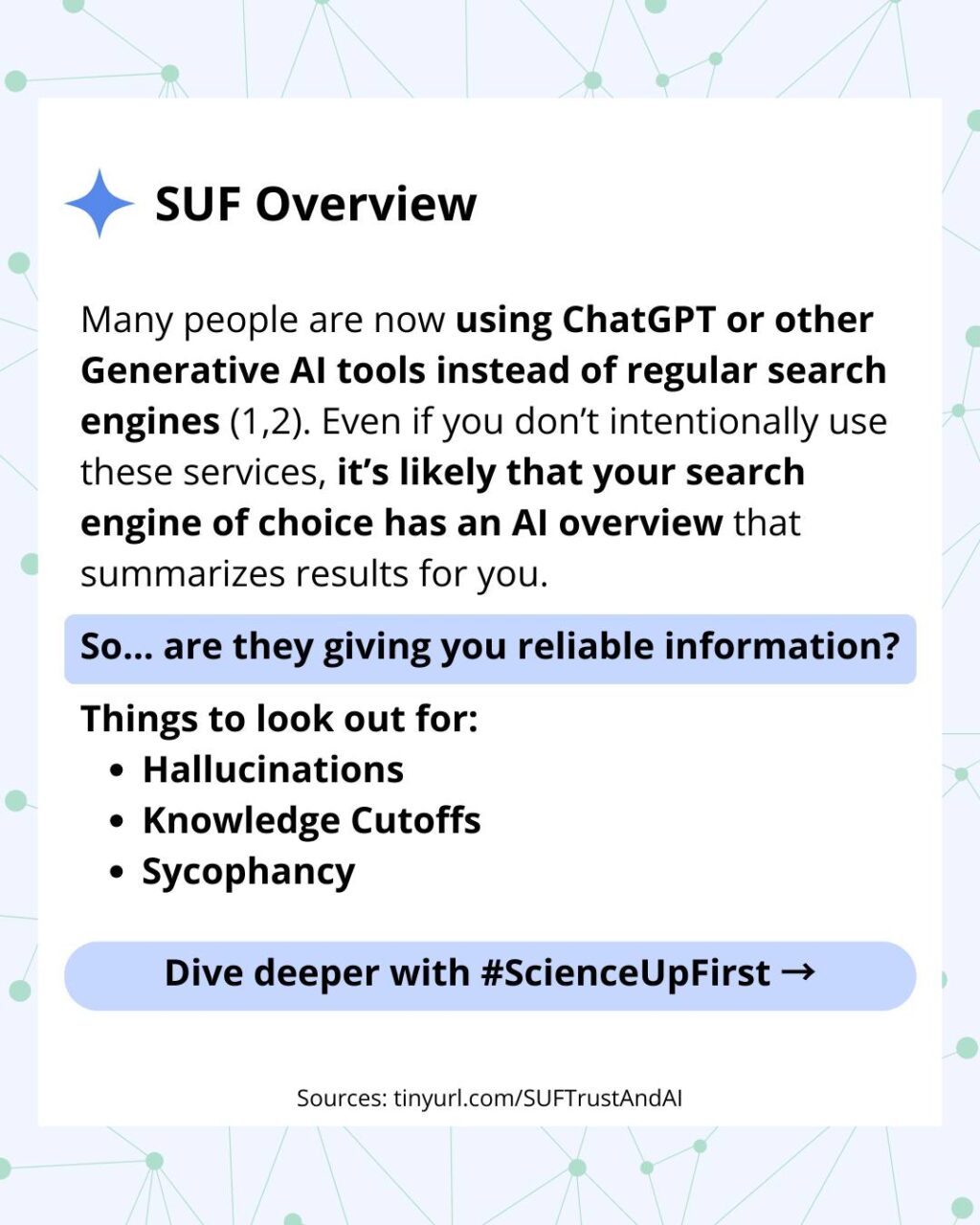
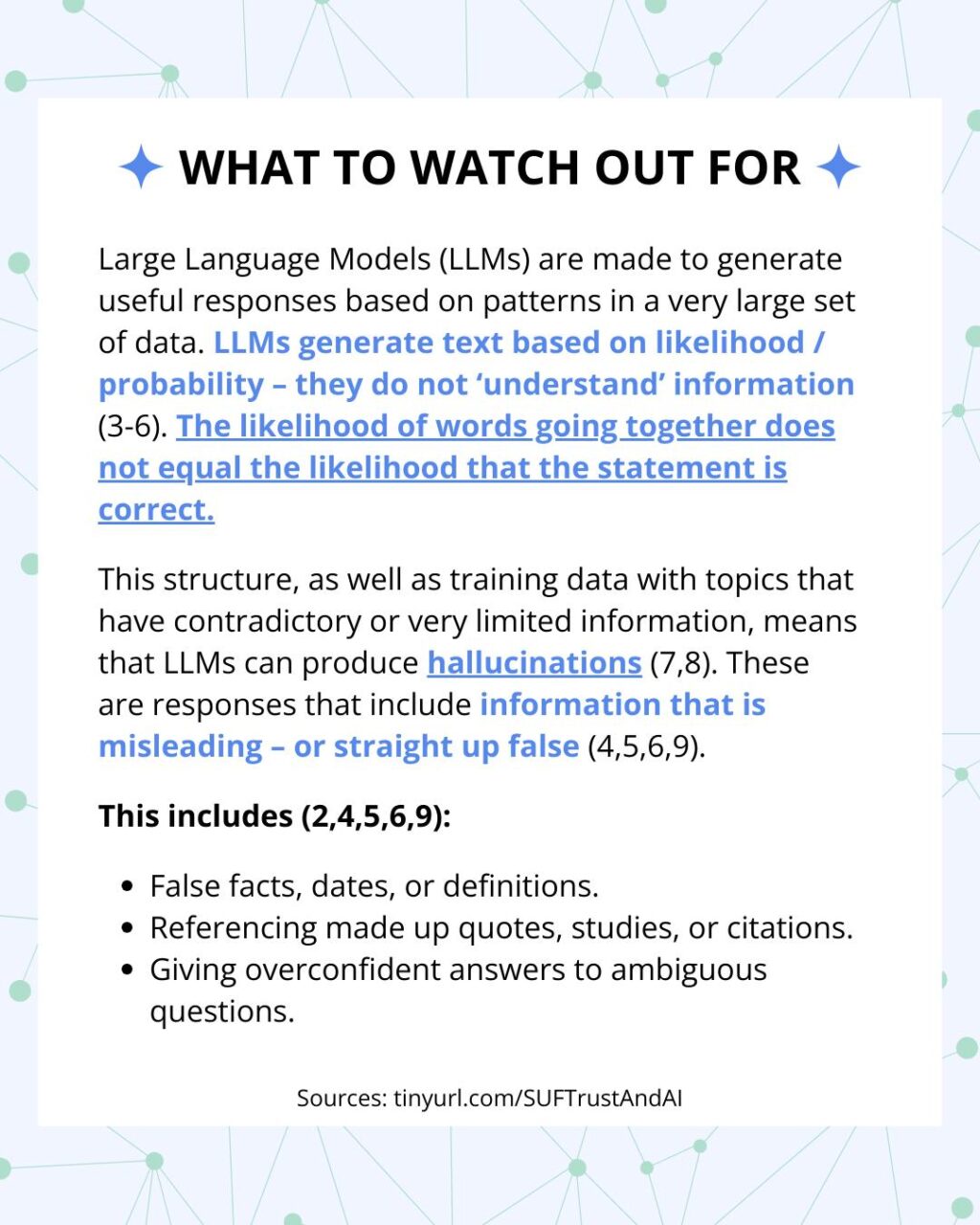
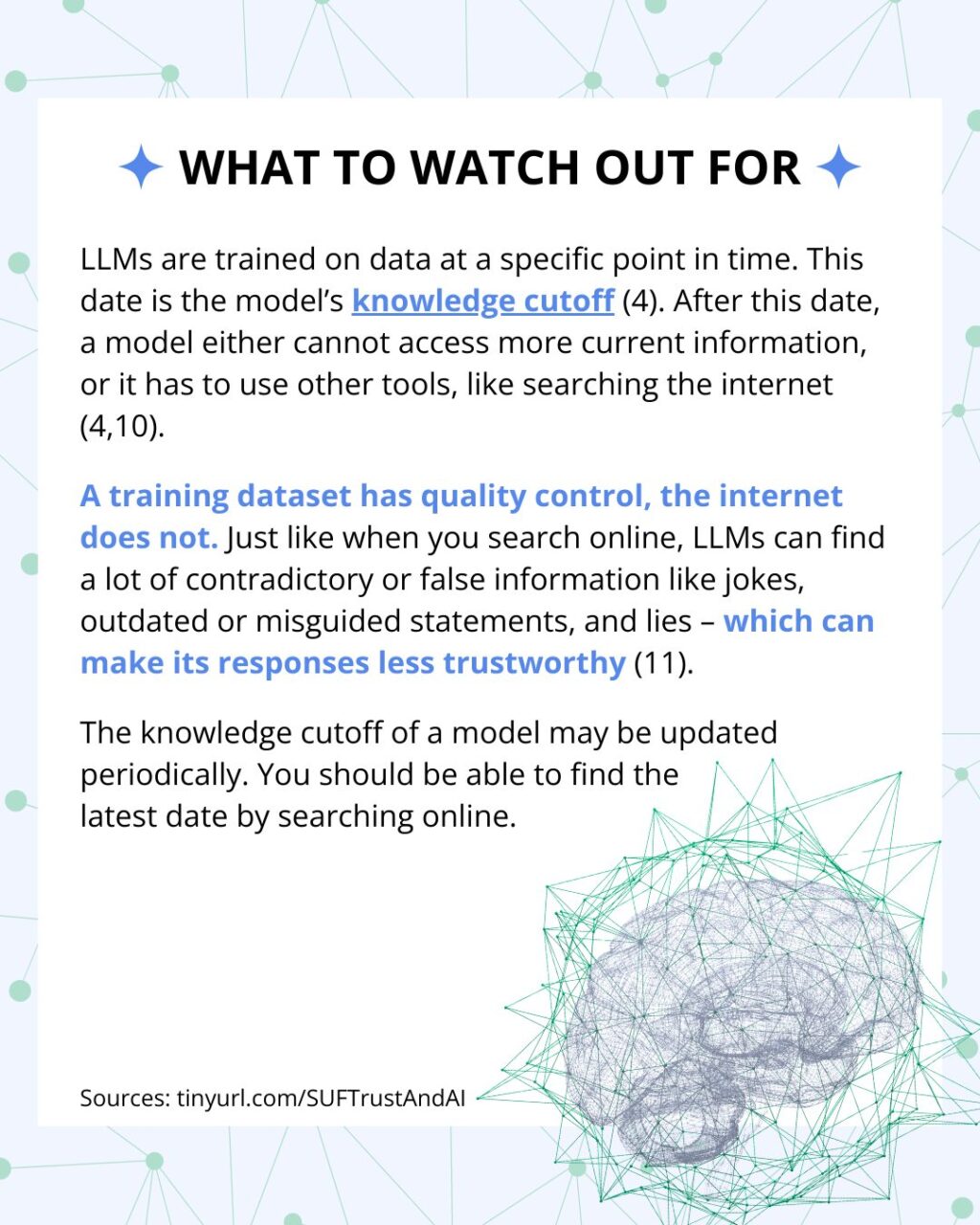
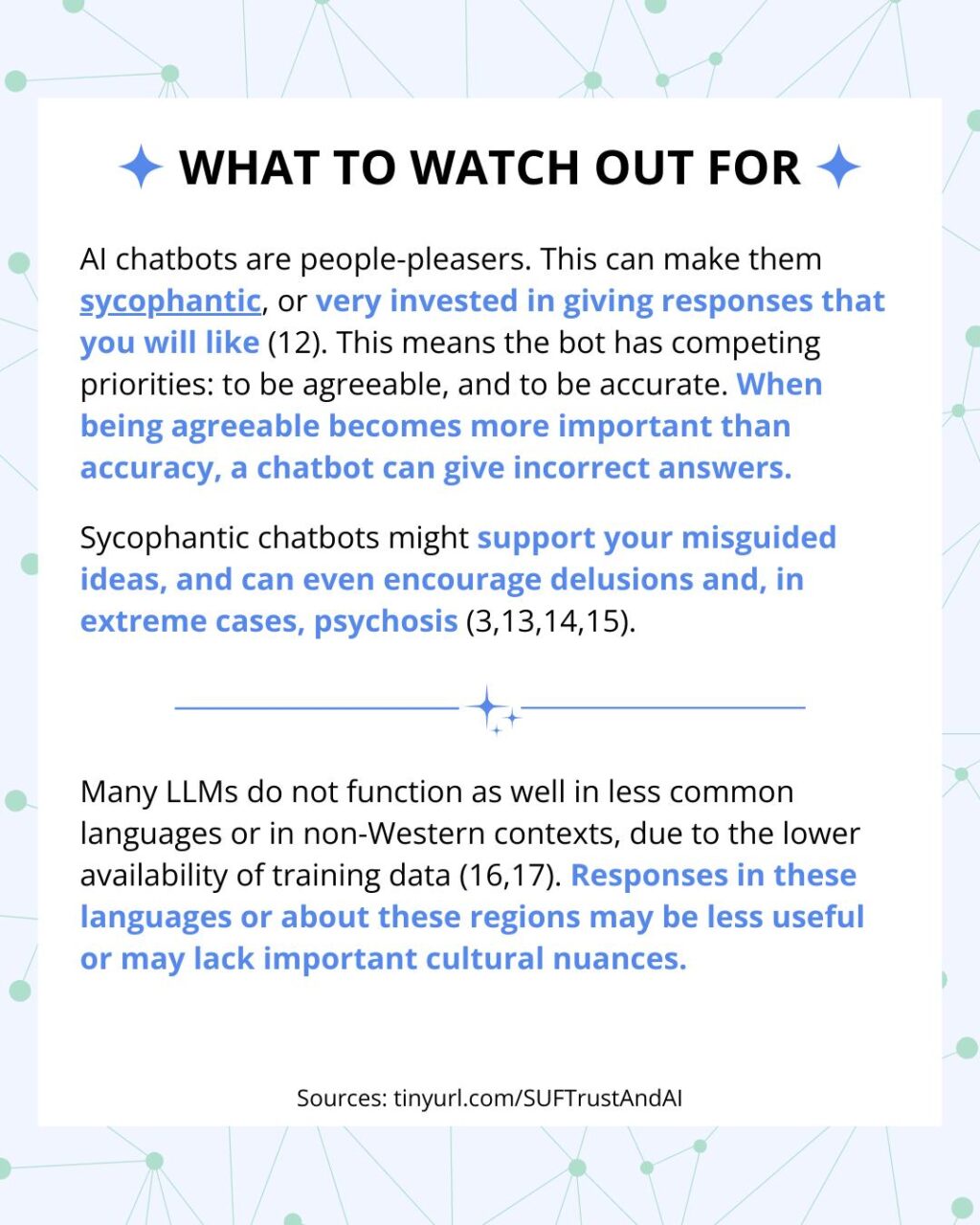
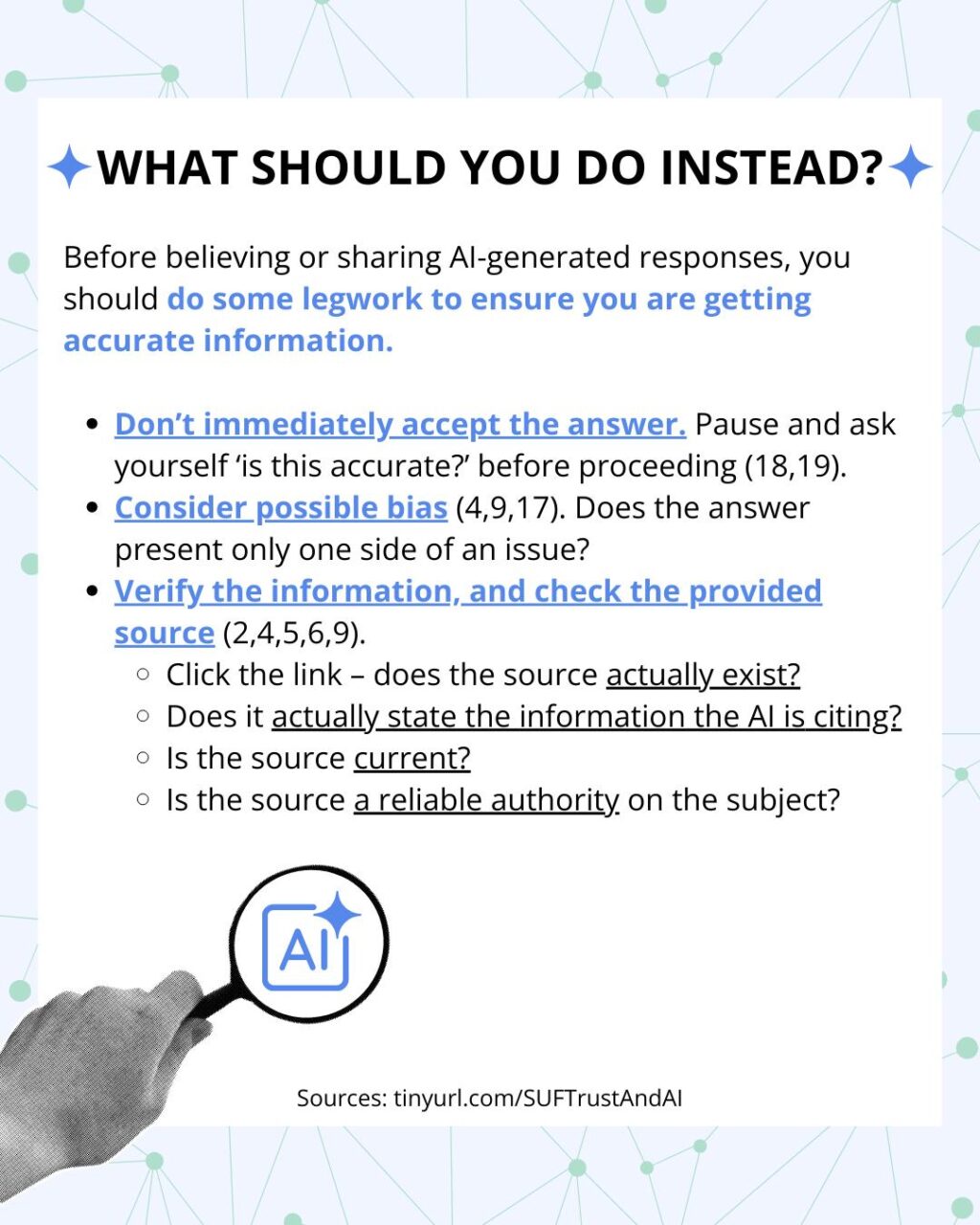
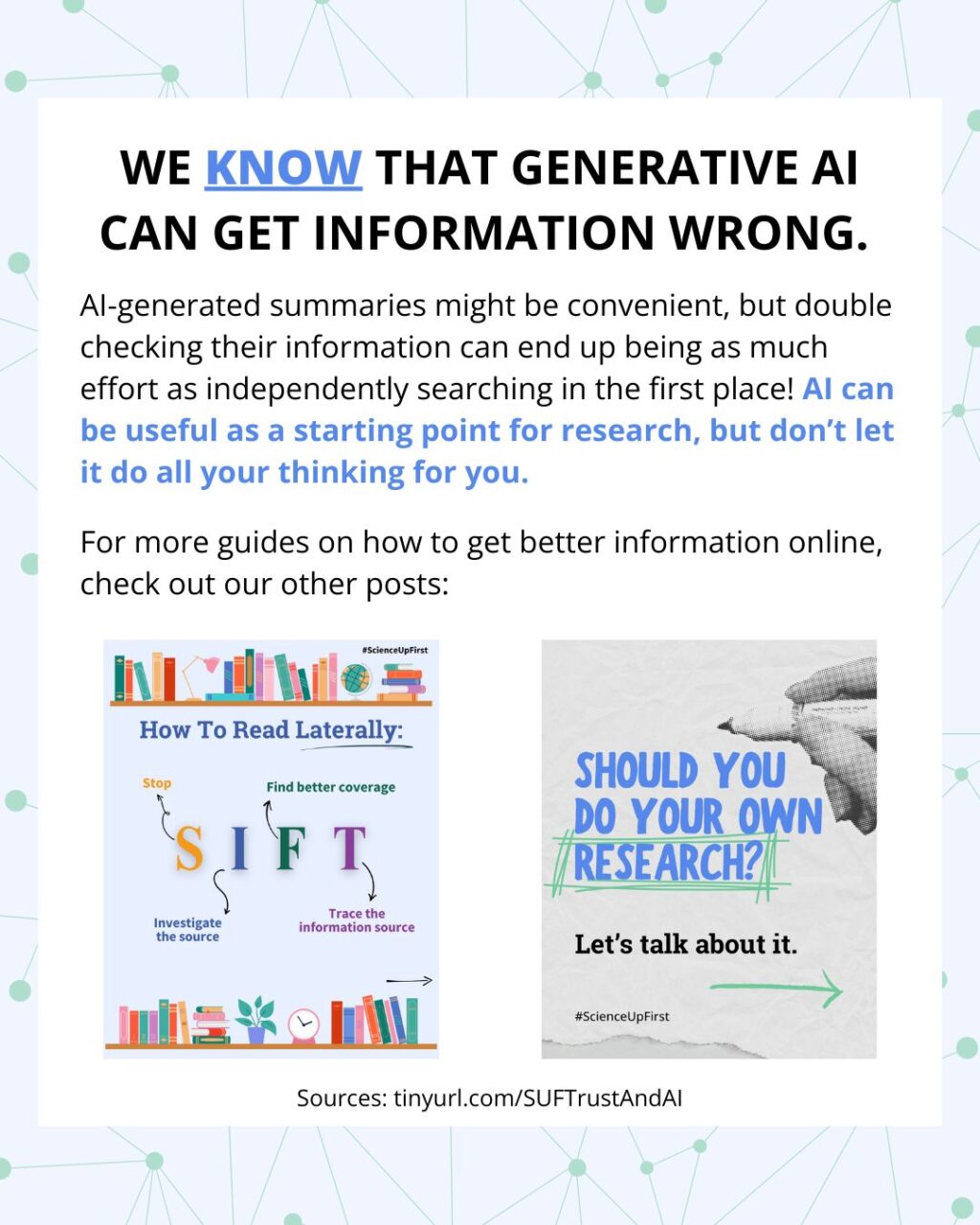
Whether you’re looking for it or not, you are probably coming across AI-generated information when searching online. 🤖
Keep reading for things to look out for and what you should do to make sure the information is accurate. 🔍
Do you have other tips for verifying AI-generated information? Let us know!
Sources- Digital News Report 2025 | Reuters Institute, University of Oxford | 17 June 2025
- Largest study of its kind shows AI assistants misrepresent news content 45% of the time – regardless of language or territory | BBC News | 22 October 2025
- Taxonomy of Risks posed by Language Models | FAccT ’22: Proceedings of the 2022 ACM Conference on Fairness, Accountability, and Transparency | 20 June 2022
- Does ChatGPT tell the truth? | OpenAI | August 2025
- The ChatGPT Fact-Check: exploiting the limitations of generative AI to develop evidence-based reasoning skills in college science courses | Advances in Physiology Education | 18 January 2025
- Using Generative AI | University of Alberta Library | 30 October 2025
- On the Origin of Hallucinations in Conversational Models: Is it the Datasets or the Models? | Proceedings of the 2022 Conference of the North American Chapter of the Association for Computational Linguistics: Human Language Technologies | July 2022
- Calibrated Language Models Must Hallucinate | In Proceedings of the 56th Annual ACM Symposium on Theory of Computing (STOC) 2024 | 20 March 2024
- How to fact-check AI | Microsoft | 19 April 2025
- What is retrieval-augmented generation? | IBM Research | 22 August 2023
- Why Google’s AI Overviews gets things wrong | MIT Technology Review | 31 May 2024
- Sycophancy in GPT-4o: what happened and what we’re doing about it | OpenAI | 29 April 2025
- Truth, Romance and the Divine: How AI Chatbots May Fuel Psychotic Thinking | Scientific American | 24 August 2025
- AI-fuelled delusions are hurting Canadians. Here are some of their stories | CBC News | 17 September 2025
- Will Generative Artificial Intelligence Chatbots Generate Delusions in Individuals Prone to Psychosis? | Schizophrenia Bulletin | 25 August 2023
- Generative AI is already helping fact-checkers. But it’s proving less useful in small languages and outside the West | Reuters Institute for the Study of Journalism | 29 April 2024
- Guide on the use of generative artificial intelligence | Government of Canada | 3 June 2025
- Understanding and combatting misinformation across 16 countries on six continents | Nature Human Behaviour | 29 June 2023
- Shifting attention to accuracy can reduce misinformation online | Nature | 17 March 2021
View our original Instagram Post!
-
Ins and Outs for 2026
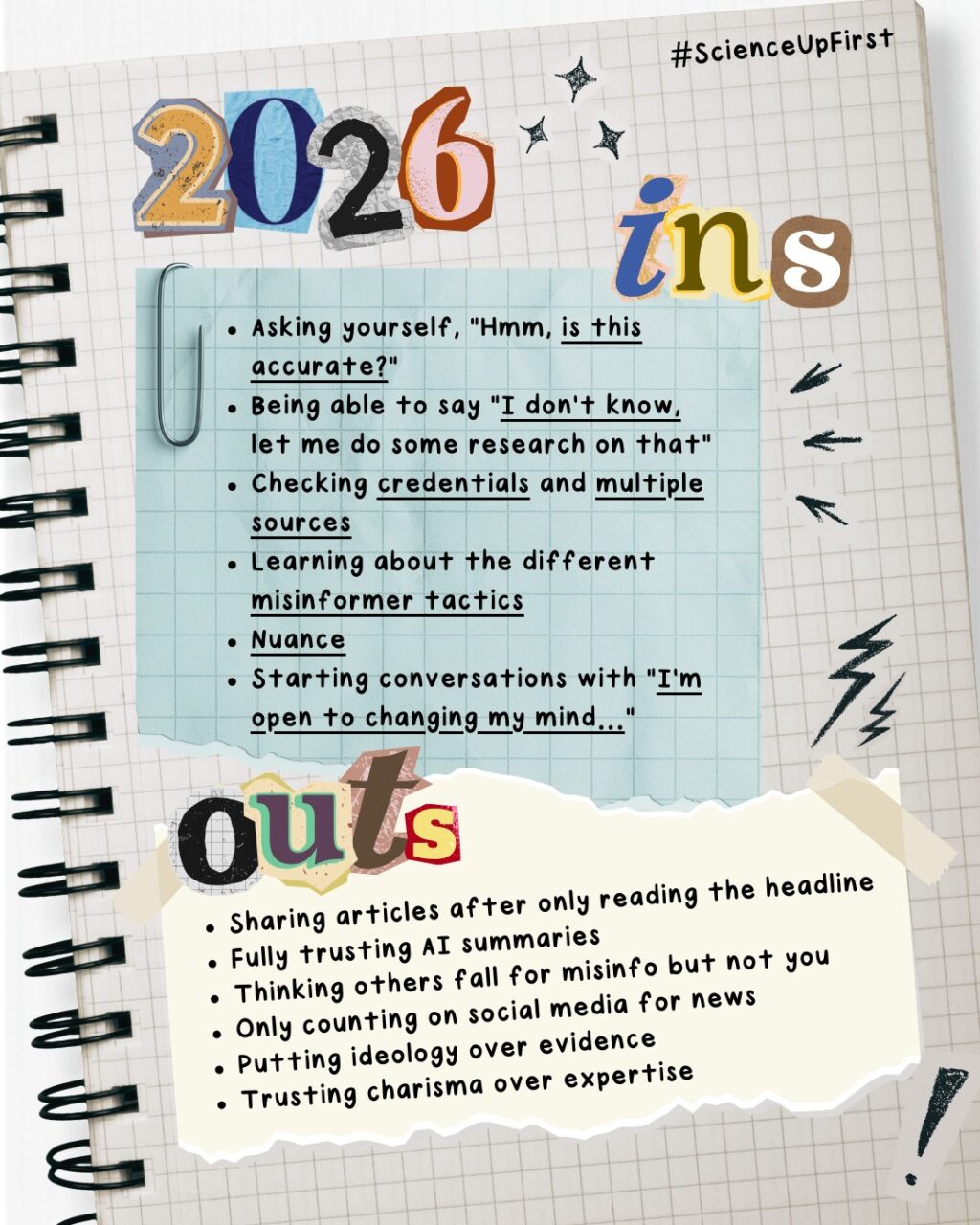
In 2026 it’s cool to care. Myth busting and critical thinking are the in thing. But relying on AI answers, charming personalities and other less than accurate sources are all out baby!
Share our original Bluesky Post!
In 2026 it’s cool to care. Myth busting and critical thinking are the in thing. But relying on AI answers, charming personalities and other less than accurate sources are all out baby! Check out our site for more “in” tips on spotting misinformation. www.ScienceUpFirst.com #ScienceUpFirst
— ScienceUpFirst (@scienceupfirst.bsky.social) January 7, 2026 at 12:24 PM
[image or embed]View our original Instagram Post!
-
Our tips for conversations on polarizing topics
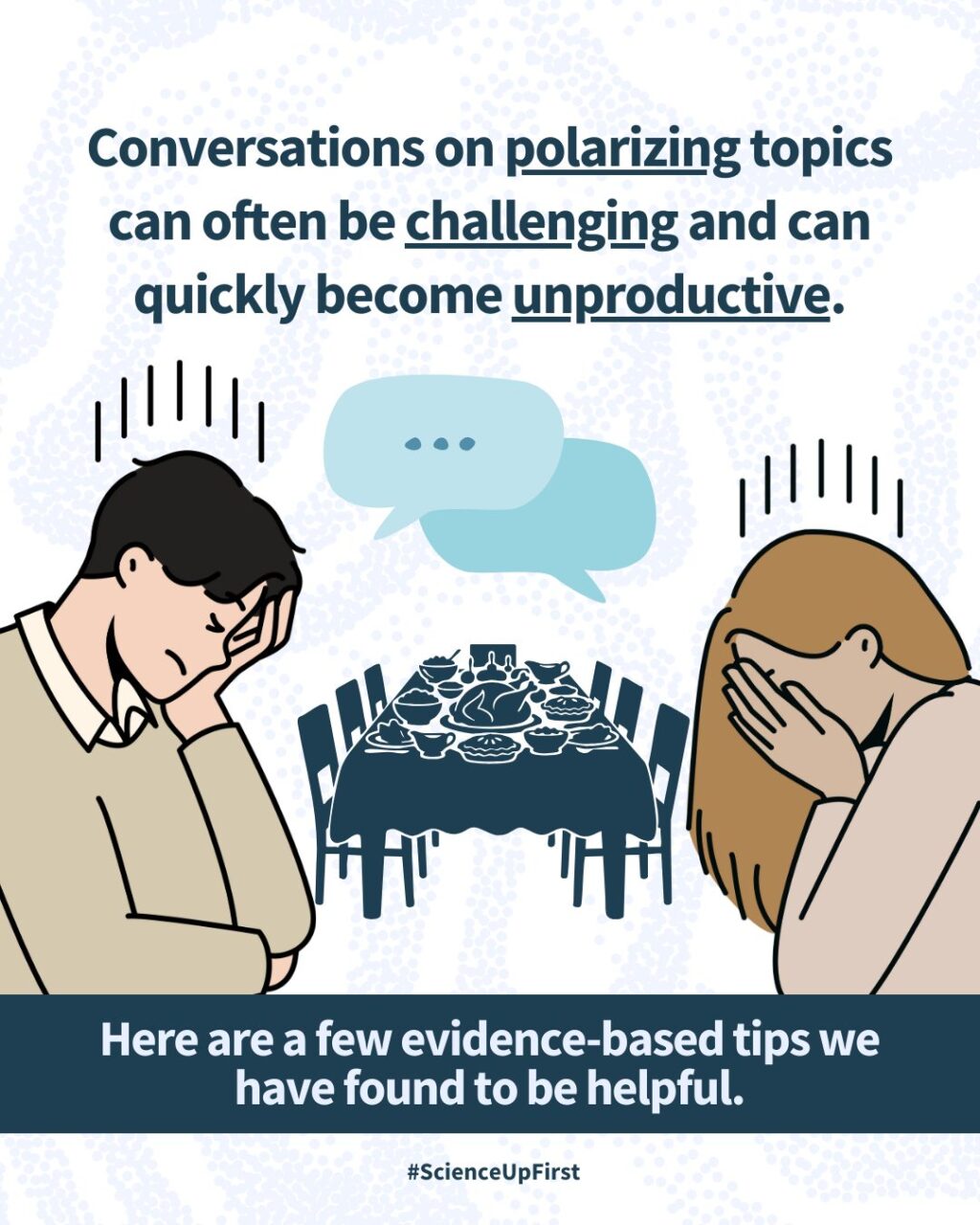

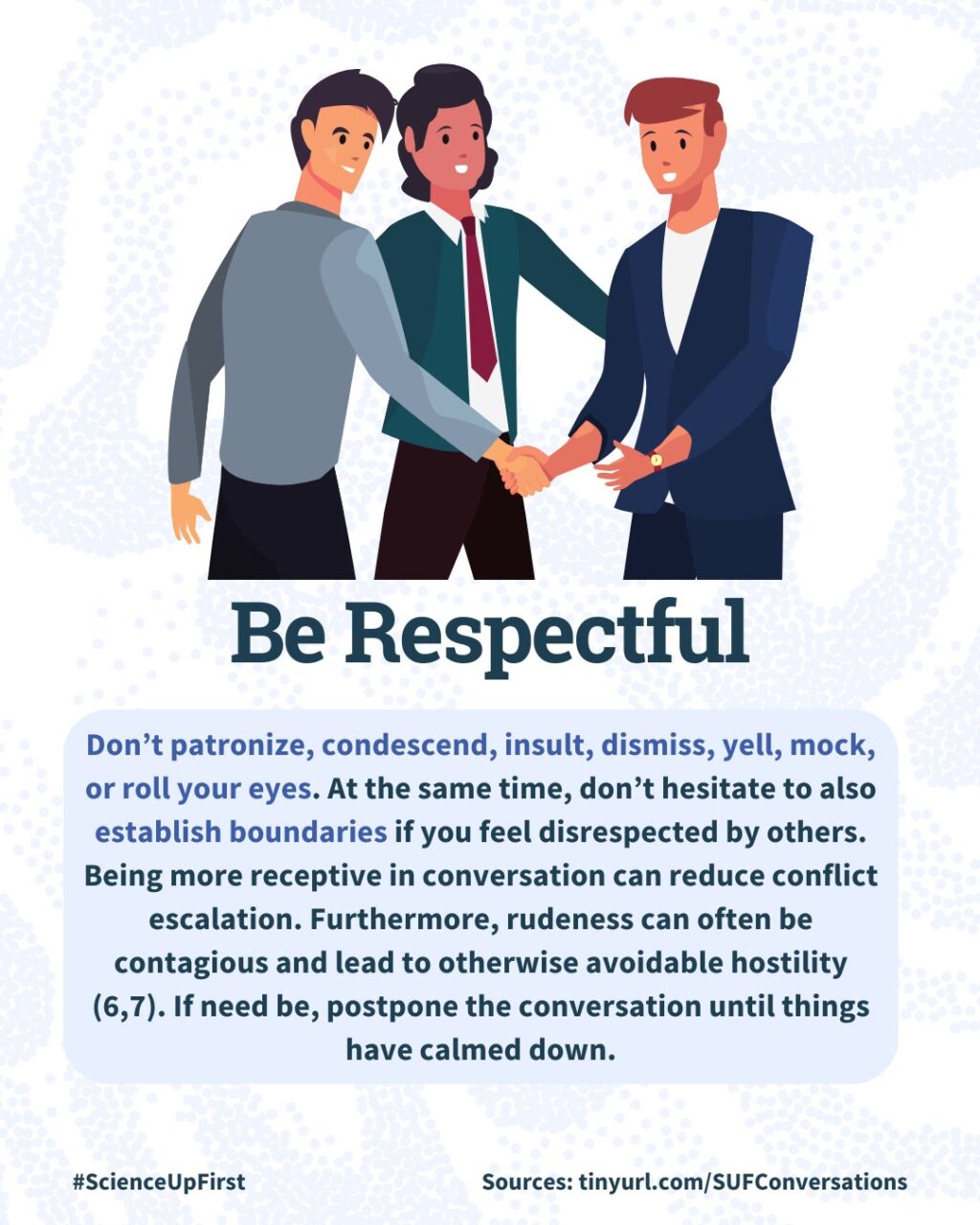

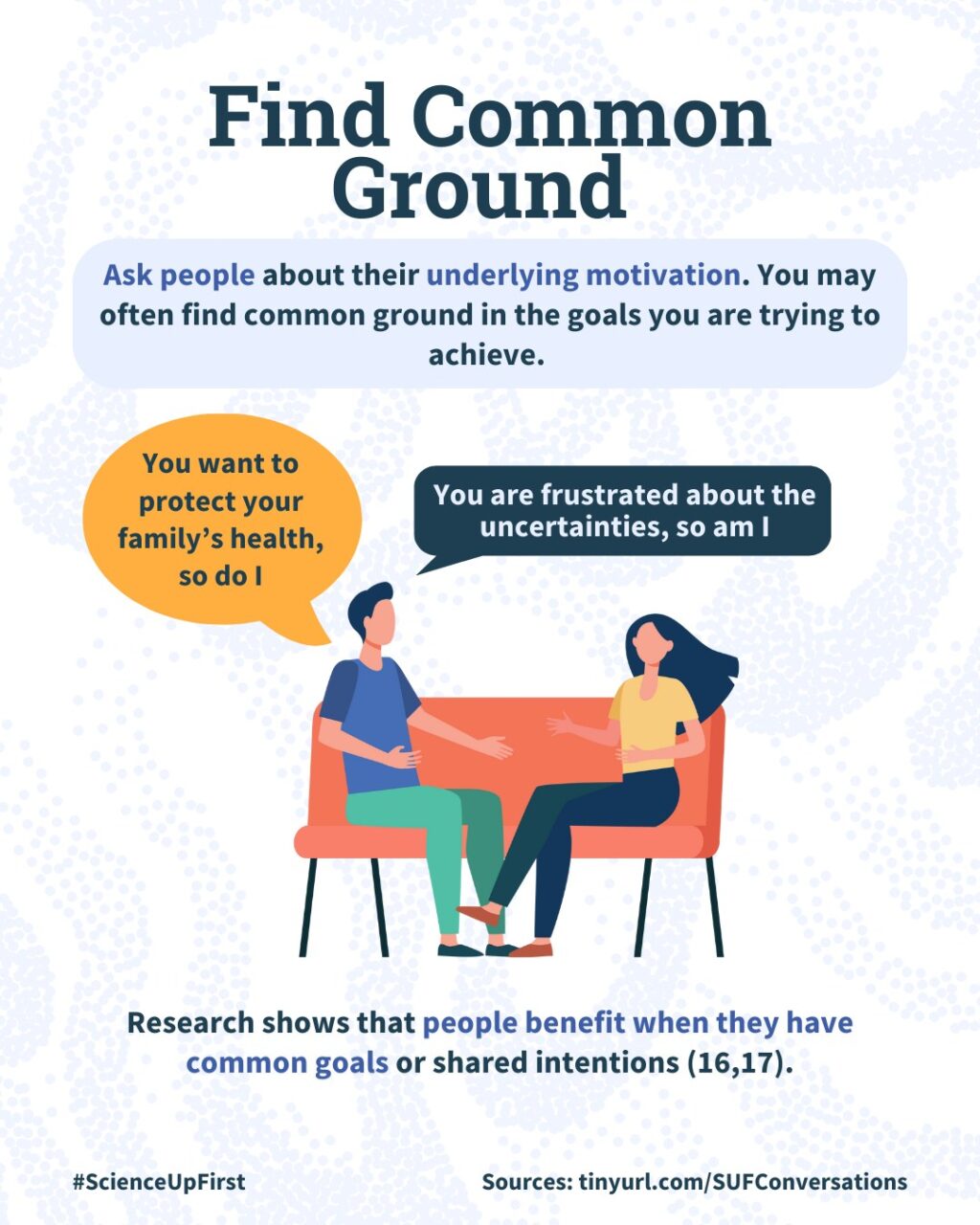
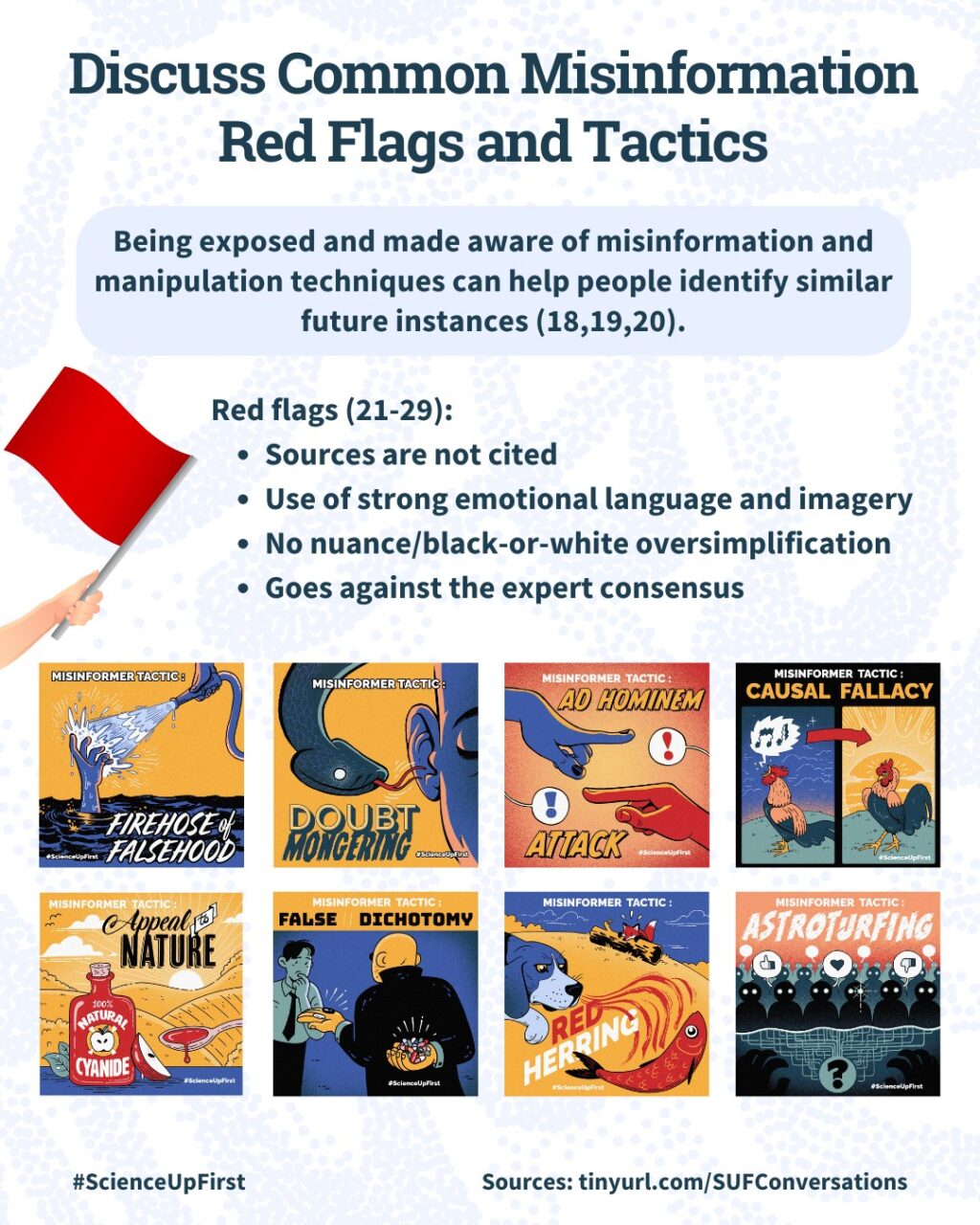
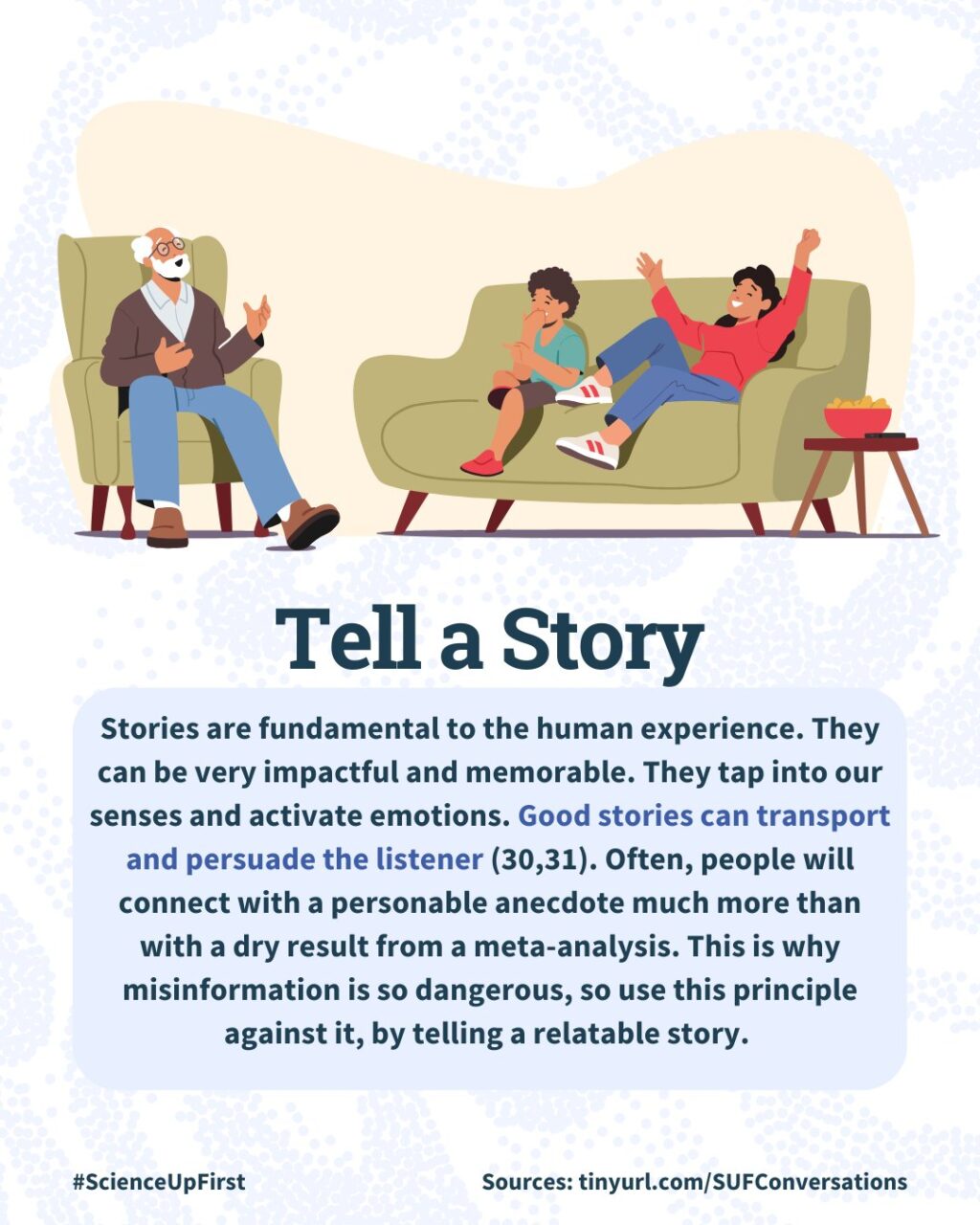
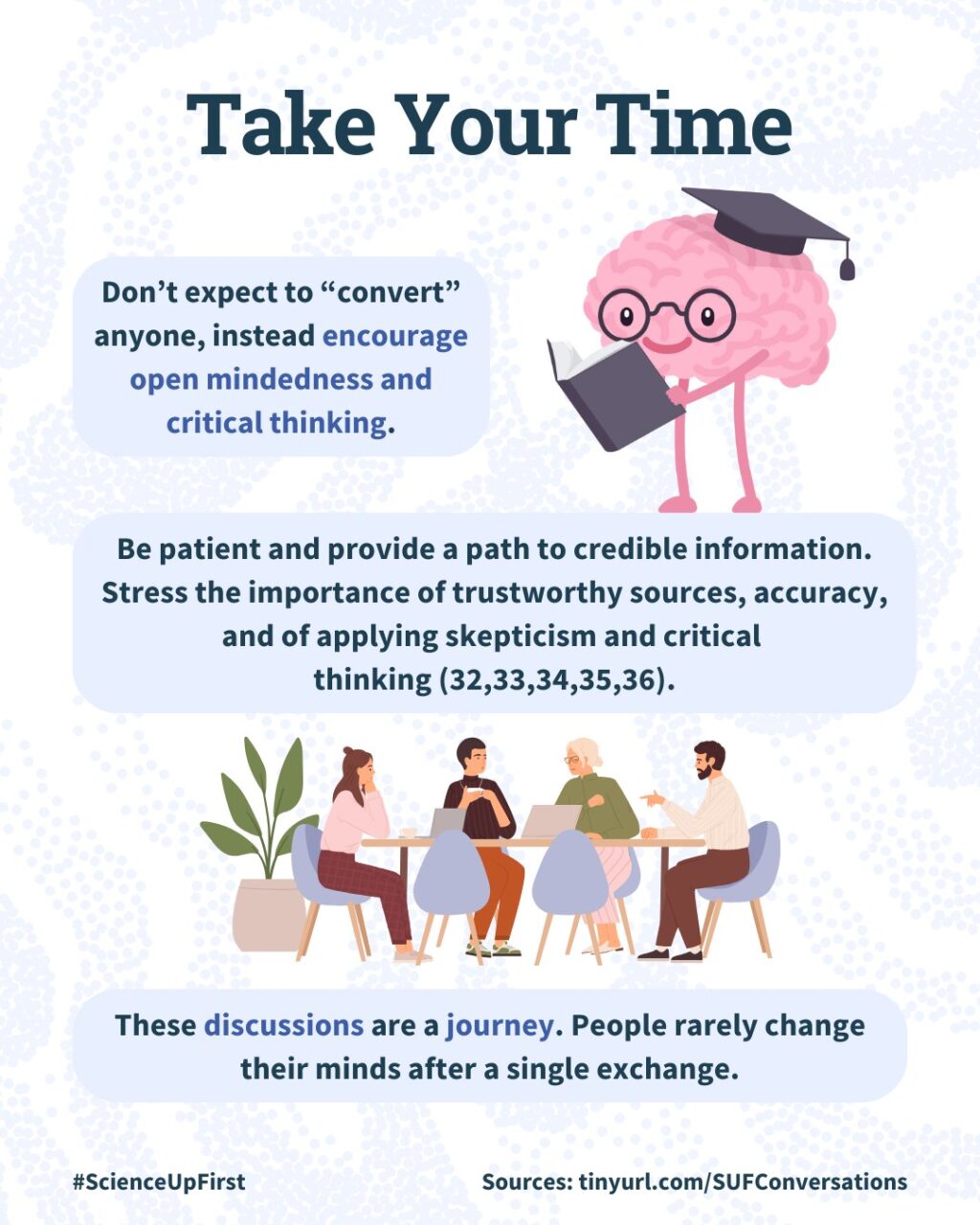
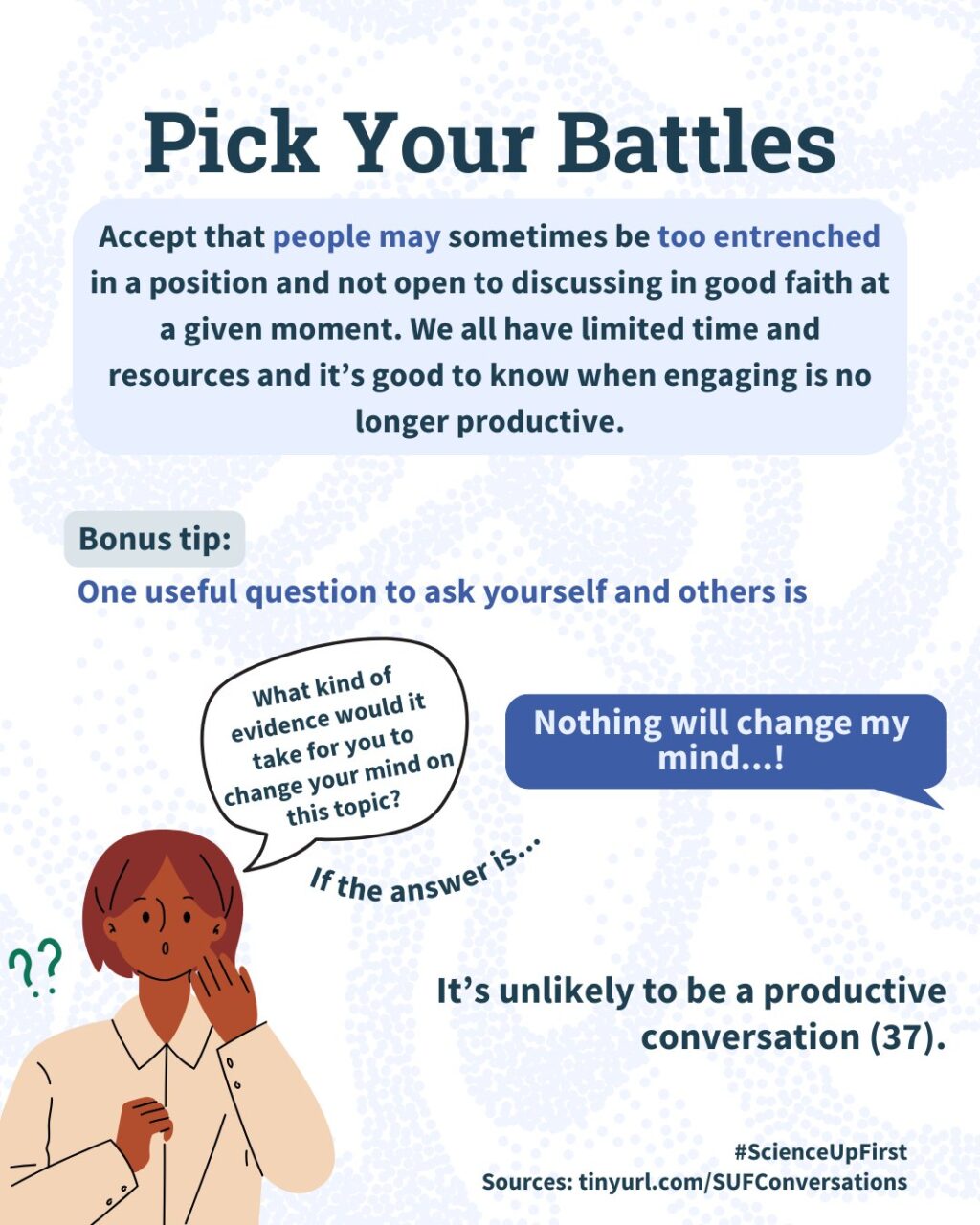
Talking about polarizing topics, whether it’s with friends or family, or strangers on the internet, can be particularly difficult. People can react adversely, get even more closed off, become aggressive, and the conversation can quickly devolve.
Here are a few tips to help you get through these difficult discussions.
What about you? What are some approaches or strategies you have found helpful when discussing controversial topics? Let us know.
There are also resources available across the country to tackle radicalization in friends and family members. Check out our references (38).
Resources
Initiatives and programs to prevent and intervene with individuals and groups at-risk of radicalization to violence: Prevention and Intervention Programs
Sources- A friendly guide to Active Listening | ScienceUpFirst | January 2024
- Active Listening | StatPearls – NCBI Bookshelf | September 2023
- The Role of “Active Listening” in Informal Helping Conversations: Impact on Perceptions of Listener Helpfulness, Sensitivity, and Supportiveness and Discloser Emotional Improvement | Western Journal of Communication | January 2015
- Are We Losing the Art of Actively Listening to Our Patients? Connecting the Art of Active Listening with Emotionally Competent Behaviors | Open Journal of Nursing | June 2015
- Supportive Listening | International Journal of Listening | February 2011
- Conversational receptiveness: Improving engagement with opposing views | ScienceDirect | September 2020
- Catching rudeness is like catching a cold: The contagion effects of low-intensity negative behaviors | Journal of Applied Psychology | January 2016
- Scientific-Consensus Communication About Contested Science: A Preregistered Meta-Analysis | Psychological Science | February 2022
- Communicating the Scientific Consensus on Climate Change: Diverse Audiences and Effects Over Time | Environment and Behaviour | 2022
- Examining the Impact of Expert Voices: Communicating the Scientific Consensus on Genetically-modified Organisms | Environmental Communication | August 2018
- Science as a Vaccine The Relation between Scientific Literacy and Unwarranted Beliefs | Science and Education | January 2019
- (Mis)informed about what? What it means to be a science-literate citizen in a digital world | PNAS | October 2019
- Hierarchy of Evidence | ScienceUpFirst | October 2021
- Hierarchy of Evidence – Evidence-Based Practice in Health | UC Library Guides at University of Canberra | Last updated July 2023
- Hierarchy of Evidence Within the Medical Literature | Hospital Pediatrics | August 2022
- The language of cooperation: shared intentionality drives variation in helping as a function of group membership | Proceedings of the Royal Society Biological Sciences | September 2017
- A Shared Intentionality Account of Uniquely Human Social Bonding | Perspectives on Psychological Science | October 2023
- Fake news game confers psychological resistance against online misinformation | Humanities and Social Sciences Communications | June 2019
- Long-term effectiveness of inoculation against misinformation: Three longitudinal experiments | Journal of Experimental Psychology. Applied | March 2021
- Inoculation theory in the post‐truth era: Extant findings and new frontiers for contested science, misinformation, and conspiracy theories | Social and Personality Psychology Compass | May 2021
- Misinformation Red Flags | ScienceUpFirst | October 2022
- Misinformer Tactic: Firehose of Falsehood | ScienceUpFirst | October 2023
- Misinformer Tactic: Doubt Mongering | ScienceUpFirst | August 2022
- Misinformer Tactic: Ad Hominem Attack | ScienceUpFirst | August 2022
- Misinformer Tactic: Causal Fallacy | ScienceUpFirst | January 2022
- Misinformer Tactic: Appeal to Nature | ScienceUpFirst | January 2022
- Misinformer Tactic: False Dichotomy | ScienceUpFirst | December 2021
- Misinformer Tactic: Red Herring | ScienceUpFirst | December 2021
- Misinformer Tactic: Astroturfing | ScienceUpFirst | December 2021
- How can we use the ‘science of stories’ to produce persuasive scientific stories? | Humanities and Social Sciences Communications | December 2017
- Narrative Persuasion and Storytelling as Climate Communication Strategies | Climate Science | August 2017
- Identifying Credible Sources of Health Information in Social Media: Principles and Attributes | National Academy of Medicine | July 2021
- “I Think This News Is Accurate”: Endorsing Accuracy Decreases the Sharing of Fake News and Increases the Sharing of Real News | Personality and Social Psychology | August 2022
- Accuracy prompts are a replicable and generalizable approach for reducing the spread of misinformation | Nature Communications | April 2022
- How to mitigate misinformation | PNAS | August 2023
- Critical thinking efficacy and transfer skills defend against ‘fake news’ at an international school in Finland | Journal of Research in International Education | April 2019
- How to talk to conspiracy theorists—and still be kind | MIT Technology Review | July 2020
- Prevention and Intervention Programs | Public Safety Canada | Last modified March 2022
Share our original Bluesky Post!
Talking about polarizing topics can be difficult. Regardless of who the conversation is with it’s better for everyone if it goes positively. Here are a few tips to help you get through these difficult discussions.😵💫 www.scienceupfirst.com/project/our-… #ScienceUpFirst
— ScienceUpFirst (@scienceupfirst.bsky.social) December 18, 2025 at 12:48 PM
[image or embed]View our original Instagram Post!
-
TikTok and Cancer Advice
TikTok can be fun, but when it comes to cancer advice, a lot of what you see can be unsafe or unreliable (1). Let’s clear some things up 👇
It’s not because cancer cells need a lot of sugar to function and that cutting sugar out of your diet will “starve” the cancer. All your cells need sugar to function. If you cut all sugar from your diet, you’ll also starve all the other, very important, cells in your body. Plus, because your body wants to survive, it will simply start breaking down fat reserves and proteins in order to get your cells (and the cancer cells) what they need. You simply can’t starve cancer by cutting all sugar from your diet, without starving your whole body (2,3,4). Even if diet plays a role in overall health, there is no evidence that cutting a single nutrient works better than proven cancer treatments.
Ivermectin is a medication proven to treat parasitic infections in humans, that’s all (5,6). Fenbendazole is also an antiparasitic drug, but it is only approved for animals and has never been tested or approved for use in humans (7). Some lab and animal studies suggest they might slow cancer growth, but the doses used would likely be toxic to humans. Limited early clinical research has shown no meaningful benefit. Most importantly, they do not show that these drugs work better than the standard treatments we already have. There’s currently no evidence that ivermectin or fenbendazole treats cancer (7-13).
Before trying any treatment you see online, check in with your physician.
Sources- We analyzed 200 cancer and autism videos on TikTok and found the majority contain misinformation | CBC News | October 2025
- Should cancer patients avoid sugar? 5 things to know | MD Anderson Cancer Center – The University of Texas | April 2024
- What’s the link between sugar and cancer? | Canadian Cancer Society
- Sugar and cancer – what you need to know | Cancer Research UK | August 2023
- Ivermectin not authorized to prevent or treat COVID-19; may cause serious health problems | Government of Canada | October 2021
- Ivermectin, ‘Wonder drug’ from Japan: the human use perspective | Proceeding of the Japan Academy, Series B Physical and Biological Sciences on PubMed Central | February 2011
- What to Know About Fenbendazole | American Cancer Society | October 2025
- Ivermectin in Cancer Treatment: Should Healthcare Providers Caution or Explore Its Therapeutic Potential? | Current Oncology Reports | July 2025
- Review article Ivermectin and Gynecologic Cancer: What are the data? | Gynecologic Oncology Reports | August 2025
- States Expand Access to Ivermectin as Cancer Myths Continue, and Abortion Pill Faces False Water Supply Claim — The Monitor | KFF | July 2025
- What Ivermectin Can (and Can’t) Do | The New York Times
- Fenbendazole as an Anticancer Agent? A Case Series of Self-Administration in Three Patients | Case Reports in Oncology | May 2025
- Fenbendazole for Pancreatic Cancer: What Research Shows | Healthline | June 2025
Share our original Bluesky post!
TikTok can be fun, but when it comes to cancer advice, a lot of what you see can be unsafe or unreliable. Let’s clear some things up 👇 #ScienceUpFirst
— ScienceUpFirst (@scienceupfirst.bsky.social) December 11, 2025 at 9:51 AM
[image or embed]View our original Instagram Post!
